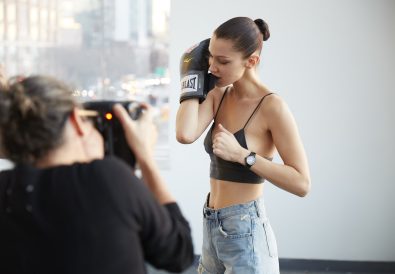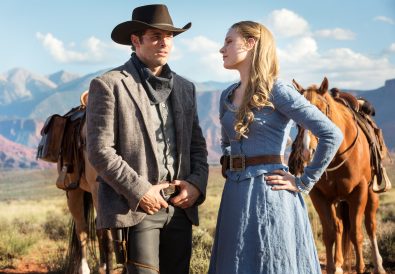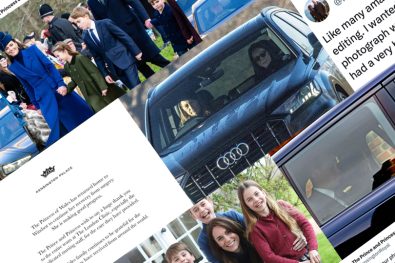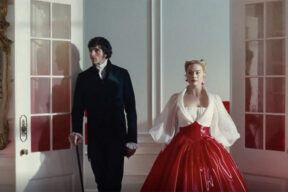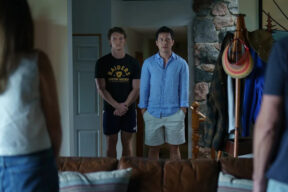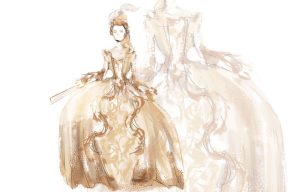Despite the progress that women have made in breaking down the walls to the boys’ club that was once the world of comedy—courtesy of the real-life Midge Maisels of history—the age-old myth that women just aren’t that funny persists. And after seeing firsthand the way that women comics are continuously brushed aside, long-time comedian and radio host Allison Dore decided to do something about it. Last year, she launched Howl & Roar Records, a Toronto-based record company that specializes in producing content from under-represented voices and more specifically, in empowering women.
Here, she walks us through her own career path, shares insight on the challenges that female comics face, and talks about how she is using her own experience suffering from mental illness and addiction to inspire others.
To start, could you introduce yourself to our readers?
I was born and raised in Ottawa, with my older brother Jon, who is an immensely talented comedian and encouraged me to get into comedy after he’d been doing it for a few years. I moved to Toronto about 15 years ago, and although I wasn’t sure about this city when I first arrived, I have grown to truly love it. I remember once taking the train back after a trip to Ottawa, and as we were pulling into Union Station,I looked at the buildings downtown and the CN Tower and thought: “Home sweet home.” I was quite surprised to realize that I finally felt like I belong here.
I was a comedian for a long time, but I stopped performing a few years ago when I realized I love helping people share their stories more than I love telling jokes. I am currently a radio personality, speaker, and the founder of Howl & Roar Records.
And perhaps my greatest achievement of all: all my life I have wanted a dog, and four years ago, I adopted a two-and-a-half-year-old corgi named Chili, and he is the greatest thing that ever happened.
Could you briefly walk us through your career path? How did you get to where you are today?
Oh boy, it was a circuitous route! I have had approximately one billion jobs, from factory work, to retail, to closed captioning, and every one of them taught me something important. I started acting when I was a teenager and assumed that that would always be my career path. I went to university for theatre performance, but I ended up dropping out in my second year because I wasn’t happy with the program. I continued to act, but I was getting into comedy at this point and the great thing about it was that you didn’t need someone to cast you, you didn’t need sets and costumes, you just needed an open mic. Not only did I love it, but I felt more control over it, since I didn’t have to wait for someone else to let me do it.
The next 10 years were marked by a variety of jobs to pay the bills, auditioning, and telling jokes. When I was 33, I was very discouraged by my lack of success and the several part-time jobs I had to supplement the tiny income I made in comedy. A comic who I didn’t really know, but had recently worked with at a club, suggested we try making a podcast, and I figured it couldn’t hurt.
A few months later, when he suggested we send a demo to the programming director at SiriusXM, I thought he was a bit crazy. But what could it hurt? I was sure nothing would come of it. And, after months of meetings, we were offered a job. But I was scared to believe it until the day we started. I was 34 and for the first time in my life I had a job I actually wanted.
A bit of luck, a bit of perseverance, a crazy partner, and a lot of life experience later, and I suddenly found myself doing the job I never knew I always wanted. This job—interviewing people especially—is so inspiring; it makes me want to learn, grow, and work harder than I ever thought possible.
Two years ago, the partner moved on, and I had another steep learning curve in taking on my own show, and it has only continued to inspire me to work hard.
I have no formal training in radio, but every experience leading up to this gave me a great foundation and skill set to take it on. Staying open, curious, and humble makes it possible to acquire the new skills to keep the job.
Last year, I combined the knowledge I had of the comedy world with the new skills I’ve learned in audio, marketing, and relationship-building and launched Howl & Roar Records. It is the scariest thing I’ve ever done, and has been a real rollercoaster, but it is so worth it.
What was your inspiration behind Howl & Roar Records?
When I first started doing my show “Allison Dore’s BroadCast,” I realized I didn’t have as much content as I wanted from Canadian women, and that a lot of very funny comics I would love to play had no content AT ALL. I basically spent a year and a half yelling at people to record albums before it hit me that I could just do the heavy lifting for them. When I thought back to the album that I had recorded a few years before, I remembered feeling like I wasn’t ready, like I wasn’t good enough, like I didn’t want to toot my own horn. I remember wishing there was someone who could take care of all the details for me, and that if certain people hadn’t pushed me to do it, I wouldn’t have. All the things I hadn’t wanted to do for my own album I could, and would love to, do for other comics.
Initially I didn’t intend to start a label. I thought I’d just low-key help out some people. But the idea just kept growing until September 19, 2018, when Howl & Roar officially launched.
Why is it important for you personally to empower female comedians?
I’ve always been good at pep talks, and I love giving them, so that helps. I have so many friends that doubt their abilities on stage, and it makes me crazy, and so when I realized I had the skill-set and the drive to not only give the pep talk but to also say “I think you are so good I want to make an album with you,” I knew I had to do it. Comedy is really a survival of the fittest kind of place, and I just wanted to make a small, soft corner where comics could hear: “Hey, I think you’re doing a great job!” And hopefully that would help them get back out there and fight another day.
Plus, over the course of my life, both in my career but also just in general, I have been lucky enough to have been helped and supported by so many amazing people. I want to do the same.
What sorts of challenges do you think that female comedians face?
I can’t remember who it was, but I remember reading an interview with a woman who had been in the business for decades, and she was talking about how women constantly have to keep proving that they are funny. If a man has been funny, he can have a bad set and still people will think: “He’s funny he’s just having a bad show.” But, if a woman has a bad set, people go back to thinking she’s not funny. The baseline societal belief still seems to be that women aren’t funny. Every woman I know has stories of people coming up to her after a great show and saying: “I don’t usually think women are funny, but you are hilarious!” Why?! Why say that? Why qualify it? Just say: “You’re funny!” I once had a teenage girl say it to me after a show and I almost lectured her about how the patriarchy affects all of us.
So, there is an added pressure to not only be funny for the perception of yourself as a comic, but also the feeling that if you have a bad set you are making every woman who tells jokes look bad.
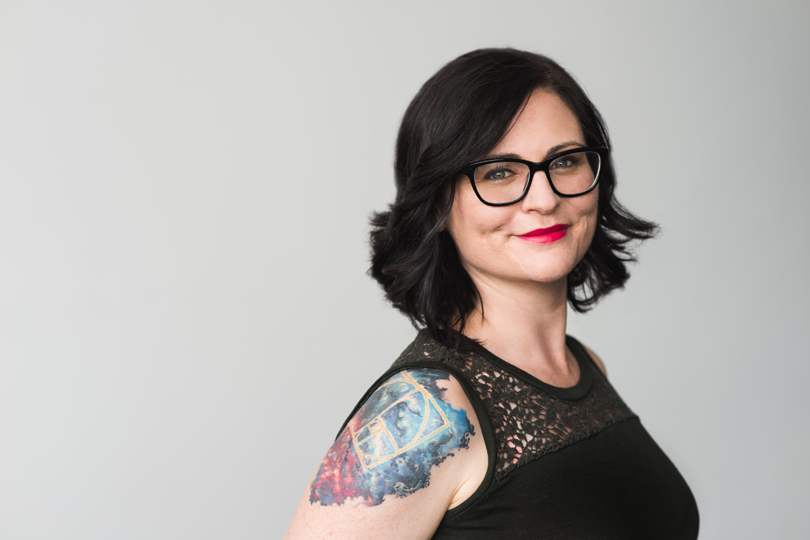
One of the other mandates of Howl & Roar is to help different voices and perspectives be heard. What are some of these other voices and perspectives that you’re trying to shine a spotlight on?
People of colour, men in the LGBTQ+ community, Indigenous comics—there are lots. The truth is,the largest population in comedy is still straight white men, so I’m just giving priority to the smaller populations in the community. And even I could do better at reaching out to people and having more diversity, so part of it is about me finding ways to seek out and reach out to these voices. It’s a constant work in progress.
Who are you particularly excited about in the Howl & Roar Records lineup in the coming months?
Oh,this is like asking who my favourite kid is! We’re doing a double recording on November 20. Brandon Ash-Mohammed and Meg MacKay are doing EP’s (albums that are 20 minutes or less). They are both super talented,and I’m excited to be part of their first recordings. And in December it’s Ian Lynch; we became fast friends over a decade ago, and it’s always a pleasure to work with someone who is not only funny but whoI also have a wonderful history with.
Who are your favourite big-name female comedians in the entertainment world today?
I love, love, love Maria Bamford, and I can just listen to her albums on a loop, over and over again. Nicole Byer is great, Jen Kirkman, Marina Franklin, Nikki Glaser, Mary Mack, Jackie Kashian… there are so many hilarious women at all levels right now and it’s so amazing and inspiring. I just realized these are all American comics and that sucks, because it’s hard to become big-name here in Canada. A few of my favourite Canadians to listen to (who have moved to the States, but still count!) are Rebecca Kohler, Debra Digiovanni, and Steph Tolev. They always make me howl.
As the host of SiriusXM Canada’s “The Breakdown” on Channel 167 and host and curator of “Allison Dore’s BroadCast” on Just For Laughs Canada (Channel 168) you celebrate women in comedy all over the world. What do you love about this work?
I have met so many amazing people doing “The Breakdown,” including some of my heroes, like when I got to interview Steve Earle this year, and sometimes just people doing incredible things. It’s easy to look at the newsor social media and get down on the human race, but there are beautiful people in this world doing beautiful things and I’ve had the privilege of interviewing a bunch of them. Interviewing people has become my favourite thing in the world, and I only hope I can continue to grow and get better at it.
For “BroadCast,” because I am essentially a DJ that plays jokes instead of songs, I have been introduced to funny women all around the world and throughout time. I mostly play current stuff, but I like to throw in jokes from the trailblazers, like Moms Mabley or Totie Fields, and pay tribute.
What’s a day-in-the-life like for you?
Every day is a bit different, with some anchors that stay the same. The day always begins and ends with going outside for a walk with Chili. And afternoons are always at SiriusXM, where I am on-air from 2:00-5:00ET. I usually try to get there around 11:00 to do show prep, work on the next episode of “BroadCast,”and do some admin stuff for Howl & Roar. Depending on my workload, I might stay until 6:00 or 7:00 to get stuff done. I have a home office as well, but it is always easier to get work done away from home.
Mornings very much depend on what needs to be done for the label. Waking up is very difficult for me, so when we come back for a walk I usually just chill out with my coffee for about an hour, adjusting to being awake. Then I get down to work. Sometimes,I’m listening to audio and making paper edits for Matt, the sound engineer. Sometimes,it’s programming albums for release. Recently,it was filling out Juno submissions for Best Comedy Album. When I’m living my best life, I incorporate the gym into my mornings, but I’m not that consistent with it.
My main thing is keeping great to-do lists and making sure the day’s priority items get done.
And to end the day I love going to bed early.I read to fall asleep and I love reading, so I like to get some chapters done before I snooze off. I am usually in bed by 10:00pm, and I try to get up at 6:30am.
What do you love about your job and the work you do?
Everything I do is something that is important and meaningful to me, and that is the ultimate luxury. After years of working jobsthatI mostly hated to pay the bills, I amnowkeenly aware of how lucky I am to get to do what I love.
Helping people share their stories, whether through the interviews I do or the jokes they tell, is an honour. I think storytelling is the most important thing out there. It creates community, teaches empathy, and increases our humanity. It’s what saves us. To play a part in that is beautiful to me. We are all a part of the fabric of this world, we all have value, and sharing who we are is magical.
You also share your story about battling mental illness and addiction as a public speaker. What message would you want to share with people that are struggling with these experiences right now that might be reading this interview?
When I had my big nervous breakdown—you’re supposed to say “major depressive episode”now, but I like nervous breakdown better;I think it’s more descriptive—I was scared that I would never get better. I was scared that I would always feel that awful, andthatI’d have to live with my parents forever because I couldn’t function.(I had had to move back in with them because I could no longer work.) I thought thatmaybe, I’d never be able to take care of myself again. I thought that it might be better to die than to live that way forever.
That was 17 years ago, and though depression certainly still comes to visit, it is less scary and less debilitating becauseof years managing it. Tenyears ago,I went to rehab and stopped self-medicating, and was strong enough to believe I could handle life without numbing myself to it.
Now,I have a life that I love so much, and opportunities that are so incredible that sometimes I have to pinch myself. And I not only take care of myself, but I also take care of my sweet little boo Chili the Corgi.
There is hope. Change is possible. You are worth it.
What’s next for you and for Howl & Roar?
Howl&Roar is booked up well into Spring of 2020, so there are lots more shows and albums coming your way! We are going to be doing some shows outside of Ontario next year,which I am very excited about. There is so much talent in Canada that needs to be heard!
And,of course,the albums we’re recording over the next few months will be coming out in the first half of 2020. If people would like they can follow us on social media @howl_roar or check out howlandroarrecords.com.
Any final thoughts?
I just want everyone to swing big. Be afraid. Doubt yourself.But do the thing anyway.


